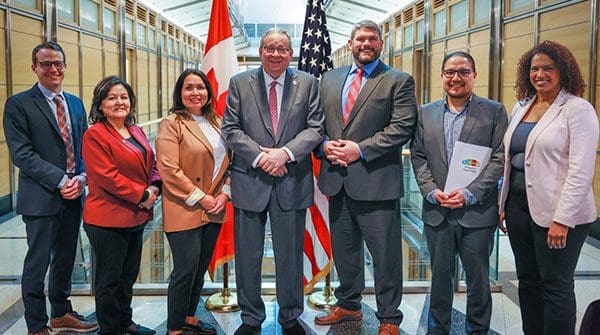Indigenous-led LNG projects essential for energy security
 As G7 leaders left Hiroshima, Japan, they made a significant admission that liquefied natural gas (LNG) is a critical fuel to help reduce dependence on Russian energy and that increased natural gas investment is essential.
As G7 leaders left Hiroshima, Japan, they made a significant admission that liquefied natural gas (LNG) is a critical fuel to help reduce dependence on Russian energy and that increased natural gas investment is essential.
“In this context, we stress the important role that increased deliveries of LNG can play and acknowledge that investment in the sector can be appropriate in response to the current crisis and to address potential gas market shortfalls provoked by the crisis,” wrote the G7 in their final communique last week.
The decision comes just weeks after a small group of Indigenous leaders went to Ottawa to meet face-to-face with diplomats from some of the world’s top economies.
Their message to the world was simple: Indigenous communities in Canada can and should be partners at the table when it comes to developing and sharing our country’s vast natural resources. And it may have resonated.
 Indigenous leaders meet with U.S. ambassador to Canada David Cohen. |
| Related Stories |
| Riyadh’s campaign for lower OPEC+ output clashes with Russia’s needs
|
| The case for energy trade with Germany is strong
|
| Improved transportation corridors could help boost Canada’s energy exports
|
For John Desjarlais, executive director of the Indigenous Resource Network, the vote of confidence for LNG is music to his ears.
“I’d like to think that we were heard – we met with some pretty influential people and heard some of the right things,” he said.
“For them to make that commitment is a big deal, and certainly a difference from some of the early indicators before the G7.”
Tapped earlier this year as the new executive director of the Indigenous Resource Network, Desjarlais found himself in Ottawa with other Indigenous leaders in April, meeting with diplomatic representatives from Canada’s G7 partners – Germany, France, Japan and the United States – as well as delegations from Poland and India.
Desjarlais said he was surprised by just how open diplomats were to the notion that Indigenous communities in Canada can be key players in the global energy marketplace.
“What a whirlwind. It was inspiring, especially speaking with the ambassadors,” Desjarlais said of the two-day diplomatic blitz that both challenged perceptions and paved a path for Indigenous voices to play a more significant role on the international stage.
“Every official had a real desire to really understand Indigenous sentiment around resource development. There was a sincere desire to learn from our perspective.”
First Nations and Metis have emerged as key partners in Canadian resource projects, particularly the country’s nascent LNG industry.
Global demand for reliable and responsibly produced LNG has continued to grow, with Russia’s invasion of Ukraine last year thrusting it into even greater prominence. The leaders of Canada’s G7 partners Germany and Japan both came to Canada last year to make direct appeals for more Canadian LNG but left with no firm commitments.
Desjarlais and a group of fellow Indigenous leaders who are on the advisory council for Energy for a Secure Future – a non-partisan coalition of business, labour and Indigenous representatives – outlined their vision for how Canada and First Nations can help be a solution in the drive for increased global energy security, while also helping lower emissions by providing a cleaner alternative to coal.
Crystal Smith, chief councillor of the Haisla Nation on B.C.’s coast, said the first step is dispelling the notion that Indigenous people oppose resource development in Canada.
“When Europeans, Asians and Americans think of Canada’s Indigenous peoples, they often think we oppose all energy development,” she said during a press conference to mark April’s diplomatic meetings.
“We aren’t victims of development. Increasingly we are partners and even owners in major projects.”
The Haisla Nation has a 50 percent ownership stake in the proposed $3-billion Cedar LNG project, which was granted regulatory approval earlier this year, and is expected to begin operations in 2027.
It marks the largest Indigenous-owned infrastructure project in Canadian history and is the first Indigenous-owned LNG terminal in the world.
Karen Ogen, CEO of the First Nations LNG Alliance, said it is projects like Cedar LNG and others currently under development that will not only help Indigenous communities achieve prosperity but help the global community in the quest for vital energy security.
“LNG development has provided immediate- and medium-termed opportunities to lift thousands of Indigenous people and our communities out of inter-generational poverty,” she said. “We are determined to develop our resources in a socially and environmentally responsible way. We want to work with Canada and our allies in the G7 to bring urgency to the development and export of Canadian LNG.”
Beyond Cedar LNG, dozens of First Nations and Métis communities have entered into equity ownership agreements in pipelines, LNG facilities and carbon capture and storage projects, among others.
The Ksi Lisims LNG project, a joint venture with the Nisga’a Nation in northern B.C., has been granted a 40-year export licence from the Canada Energy Regulator, while in Atlantic Canada the Miawpukek First Nation is a part-owner of the proposed export project LNG Newfoundland and Labrador.
Large consortiums representing Indigenous communities have also acquired or are looking to acquire stakes in major pipeline projects, including Coastal GasLink, Trans Mountain, and several oil sands pipelines.
According to Desjarlais, the Ottawa summit proved to be a fruitful meeting of the minds. He said it could signal a more important role for Indigenous communities both as more equal resource partners in Canada and on the world stage as well. The group has been asked to meet with U.S. Ambassador David Cohen again in June.
“I never thought it would accelerate to this point – it’s accelerating so fast,” he said.
“Ownership is reconciliation. There’s a whole cascade of benefits that come from these projects everywhere.”
Shawn Logan is Campaign and Advocacy Lead with the Canadian Energy Centre, a Troy Media Editorial Content Provider Partner.
For interview requests, click here.
The opinions expressed by our columnists and contributors are theirs alone and do not inherently or expressly reflect the views of our publication.
© Troy Media
Troy Media is an editorial content provider to media outlets and its own hosted community news outlets across Canada.

